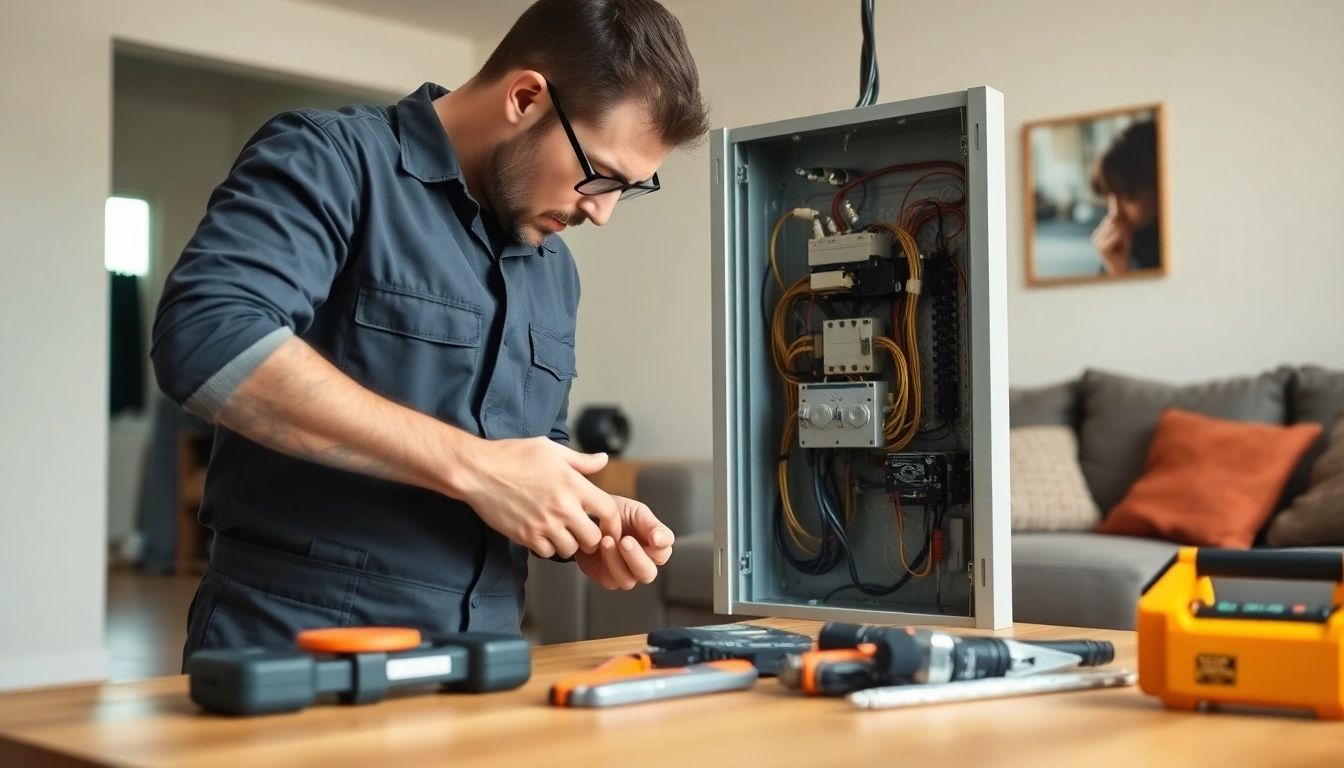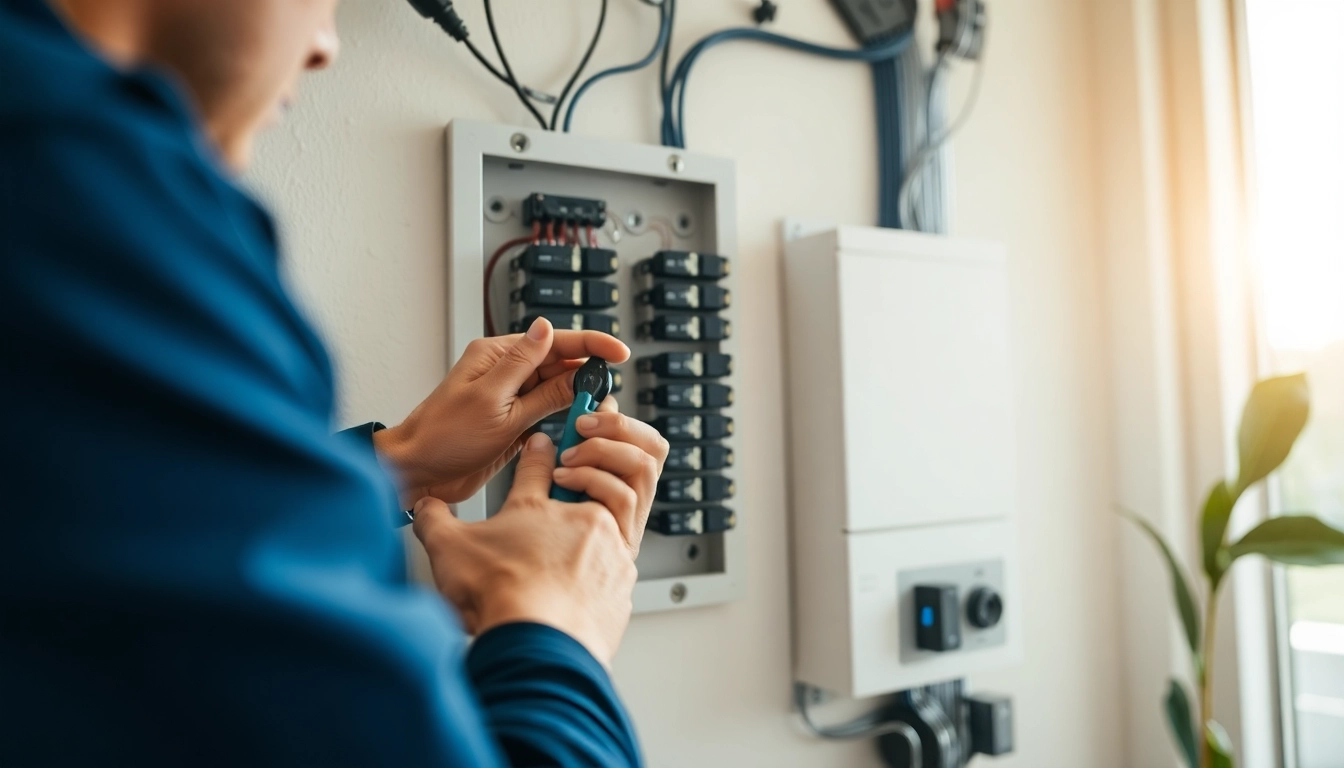Why Upgrading Your Electrical Panel Is Essential for Safety and Efficiency
Understanding the Electrical Panel Upgrade
Upgrading your electrical panel is a crucial component of maintaining your home’s electrical system. Whether you’re looking to support new technologies like electric vehicles or simply want to ensure your home is safe and efficient, understanding what an electrical panel is and why an upgrade might be necessary is essential. An Electrical Panel Upgrade encompasses various factors, including safety, capacity, and compliance with modern electrical requirements.
What is an Electrical Panel?
The electrical panel, often referred to as the breaker box, is the central hub of your home’s electrical system. It serves as the point where electricity from the utility company enters your home and is distributed to the various circuits throughout your property. The main components of an electrical panel include the main breaker, circuit breakers, and bus bars. Each circuit breaker controls the flow of electricity to different areas or appliances within your home, preventing overloads and ensuring safety. Understanding the functions of these components can help you better appreciate the need for an upgrade when it becomes necessary.
Benefits of Upgrading Your Electrical Panel
There are numerous benefits to upgrading your electrical panel, including:
- Increased Capacity: One of the most significant advantages is the capacity increase, allowing for more devices to be used simultaneously without risking overload.
- Improved Safety: An updated panel comes with newer technology that meets modern safety codes, reducing risks such as electrical fires or shorts.
- Enhanced Power Distribution: Newer panels offer better power distribution, which can improve the performance of appliances and reduce the chances of tripped breakers.
- Future-Proofing: Upgrading prepares your home for future electrical demands, such as the addition of smart home technology and electric vehicle (EV) chargers.
Signs You Need an Electrical Panel Upgrade
Identifying the right time to upgrade your panel is vital for the safety of your home. Here are some common signs that indicate it may be time for an upgrade:
- Your home has a 100-amp panel and you’re experiencing issues with power outages or blown fuses.
- If your panel is older than 20 years, it may not meet current safety standards or handle modern electrical loads.
- Frequent tripping of circuit breakers can indicate that your electrical system is overloaded.
- If you notice flickering lights, especially when using multiple devices, it may signal that your panel is struggling to keep up.
- Plans to renovate or add major appliances should prompt a review of your panel capacity.
Cost Considerations for Electrical Panel Upgrades
Average Costs for Different Panel Types
The cost of an electrical panel upgrade can vary widely, depending on the type of panel, the complexity of the installation, and your location. On average, homeowners can expect to pay between $800 and $4,000. Some typical scenarios are outlined below:
- 100 to 200 Amp Upgrade: This common upgrade often ranges from $1,300 to $3,000. It is suitable for most families looking to meet contemporary electrical demands.
- 200 to 400 Amp Upgrade: If your home is larger or you need to support multiple high-demand devices, this can cost between $2,000 and $5,000.
- Commercial Upgrades: For businesses, costs can exponentially increase depending on the complexity and capacity needed.
Factors Affecting Upgrade Costs
Several factors can influence the total cost of an electrical panel upgrade:
- Location: Labor costs vary by region, so pricing might differ based on where you live.
- Panel Type: The brand and specifications of the new panel can affect costs.
- Installation Complexity: If your home requires additional electrical work (such as updated wiring), costs will increase.
- Permit and Inspection Fees: Many areas require permits for electrical upgrades, which will add to your overall costs.
Financing Options and Rebates
Many homeowners may consider financing options or rebates for electrical panel upgrades. Local utility companies, energy companies, or governmental rebates can significantly reduce costs. Some financing options include:
- Home Equity Loans: Utilizing your home’s equity can provide the necessary funds for an upgrade.
- Credit Cards with Incentives: Many cards offer rewards for home improvement purchases, but be sure to consider the interest rates.
- Energy Efficiency Programs: Some programs might even provide cash rebates for making your home’s electrical system more efficient.
Process of Upgrading Your Electrical Panel
Choosing the Right Electrical Panel for Your Home
Selecting the right electrical panel is crucial to meet your home’s demands effectively:
- Assess Your Needs: Think about how much power you’ll need, especially if you’re adding major appliances or EV chargers.
- Look for Updated Technology: Newer panels often come equipped with safety features like surge protection and smart technology compatibility.
- Consult a Professional: Determining the correct amperage and technology can be complex, so enlisting the help of a licensed electrician ensures you make an informed choice.
Steps to Complete the Upgrade Safely
Upgrading an electrical panel is a task best left to professionals, as working with electricity can be hazardous. Nonetheless, here are the general steps involved:
- Assessment by a Licensed Electrician: A professional will assess your current panel and your home’s wiring.
- Obtain Necessary Permits: Before any work can begin, permits must be secured from your local electrical authority.
- Power Shutdown: The main power supply will be shut off to ensure safety during the upgrade.
- Remove the Old Panel: The existing panel is carefully disconnected and removed.
- Install the New Panel: The new panel is installed, ensuring all connections are safe and compliant.
- Inspection and Testing: Once installed, the system will be inspected and tested to ensure proper function.
Hiring a Professional vs. DIY
When it comes to upgrading your electrical panel, one crucial decision is whether to hire a professional or attempt DIY:
- Hiring a Professional: Though more expensive, professional electricians bring expertise that ensures safety and regulatory compliance. Their experience can prevent common issues and save time.
- DIY Risks: Attempting this upgrade on your own can lead to dangers, including electrical shock, fires, and code violations. It is often not worthwhile to save money at the risk of safety.
Post-Upgrade Considerations
Inspecting Your New Electrical Panel
After the installation, conduct a thorough inspection of your new electrical panel:
- Check that all circuit breakers are properly labeled for easy identification.
- Ensure that there are no exposed wires or loose connections.
- Verify that the panel door closes properly and that there is adequate ventilation around the panel.
Maintaining Your Electrical System After an Upgrade
Regular maintenance can extend the life of your electrical panel:
- Regular Inspections: Schedule electrical inspections every few years to identify any potential issues early.
- Keep it Clean: Ensure the area around your electrical panel is free of dust, clutter, and flammable materials.
- Document Changes: Keep records of any modifications made to your electrical system or panel.
How to Manage Increased Electrical Load
With an upgraded panel, understanding how to manage your new electrical load is essential:
- Load Balancing: Spread out the use of high-demand appliances to different circuits to avoid overload.
- Monitor Usage: Consider installing a home energy monitor to track usage in real-time.
- Upgrading Appliances: If your appliances are outdated, consider upgrading to energy-efficient models that require less power.
Conclusion: The Long-Term Impact of an Electrical Panel Upgrade
Improving Home Safety and Efficiency
Upgrade your electrical panel not only enhances safety but also contributes to energy efficiency. Modern components reduce energy loss, improve power distribution, and create a safer environment overall for your home.
Future-Proofing Your Electrical Needs
As technology continues to advance, making the decision to upgrade your electrical panel can prepare you for the future. Future-proofing ensures that your home is equipped to handle smart home technologies, higher-capacity electrical vehicles, and even potential expansions in electrical appliances.
Final Thoughts on Electrical Panel Upgrades
Understanding the necessity and benefits of upgrading your electrical panel is crucial for the safety and functionality of your home. From increased power capacity to enhanced safety and efficiency, an upgrade can provide lasting value. If you notice any initial signs pointing to the need for an upgrade, consider consulting a professional electrician to explore your options.














Post Comment